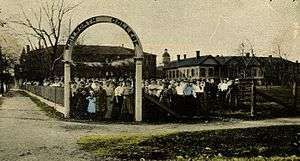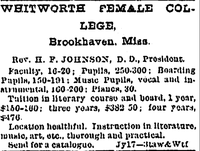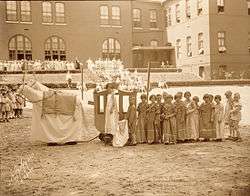Whitworth Female College
Whitworth Female College was a Methodist women's college in Brookhaven, Mississippi, founded in 1858 by Milton Whitworth.

History
The college was founded in 1858[1] by Milton J. Whitworth,[2] opened in 1859,[3] and disestablished in 1984.[1] It was associated with the Mississippi Methodist Conference until 1938.[4]
During the Civil War the college was used as a Confederate hospital and managed to reopen after the war's end.[2]

In August 1878, local freemasons laid the cornerstone for a new brick building at the college, into which a time capsule was placed. Both U.S. Senator from Mississippi Lucius Quintus Cincinnatus Lamar II and Jefferson Davis were expected to attend the ceremony but were "unavoidably absent."[5]
In 1925 the College was first accredited by the Southern Association of Colleges and Schools.[4] In 1928 the College began operation as a two-year institution associated with Millsaps College in Jackson, Mississippi.[4] In 1938, because of financial difficulties, the board of trustees of the College voted to cease operations and merge the school with Millsaps College.[4] The city of Brookhaven bought the campus and leased it out to various short-lived colleges between 1941 and 1984, when all educational operations at the location ceased.[4]
In 2003 the state of Mississippi opened the Mississippi School of the Arts on the grounds of the former college.[6]
Vardaman's visit

During his term as Governor of Mississippi (1904-1908), white supremacist politician James Kimble Vardaman, known as the "Great White Chief," spoke at the college and was presented with a bouquet and the following poem:
TO THE "WHITE CHIEFTAIN."
White flowers to our chieftain white,
Brookhaven's daughters send;
To welcome him with glad delight
The Southland's truest friend.
Be not afraid! Thou white man's chief,
The Anglo-Saxon Race
Has yet to bend its neck beneath
A victor's cruel mace.
The blood is yours on land and sea
Uphold thro' its supremacy.[7]
Notable alumnae
- Lulah Ragsdale (1862-1953), poet, novelist and actor
- Nellie Nugent Somerville, first woman elected to the Mississippi Legislature[8]
References
- Patti Carr Black; Marion Barnwell (2002). Touring Literary Mississippi. Univ. Press of Mississippi. p. 110. ISBN 978-1-57806-367-3.
- "Renovation Funds in Housing Bill Old College Will Benefit". The Sun Herald. October 9, 1998. p. A14.
- Works Progress Administration; Robert S. McElvaine (2009). Mississippi: The WPA Guide to the Magnolia State. Univ. Press of Mississippi. p. 515. ISBN 978-1-60473-289-4.
- "Whitworth College Archive". Lincoln-Lawrence-Franklin-Regional Library. Retrieved January 22, 2014.
- Dan'l Dennett (August 25, 1878). "Agricultural. The Farm--Work-Shop--Factory-Home--School--Church". The Daily Picayune (Times-Picayune). p. 10.
- "Arts school director retiring, MS". Associated Press News Service. May 25, 2009.
- Trent A. Watts (30 September 2010). One Homogeneous People: Narratives of White Southern Identity, 1890–1920. Univ. of Tennessee Press. p. 33. ISBN 978-1-57233-743-5.
- "Women Wielding Power-Mississippi". nwhm.org. Retrieved 21 September 2015.
Further reading
- "Whitworth College Archive". Lincoln-Lawrence-Franklin-Regional Library. Retrieved January 22, 2014.
- "Whitworth College Photographic Archive". Lincoln-Lawrence-Franklin-Regional Library. Retrieved January 22, 2014.